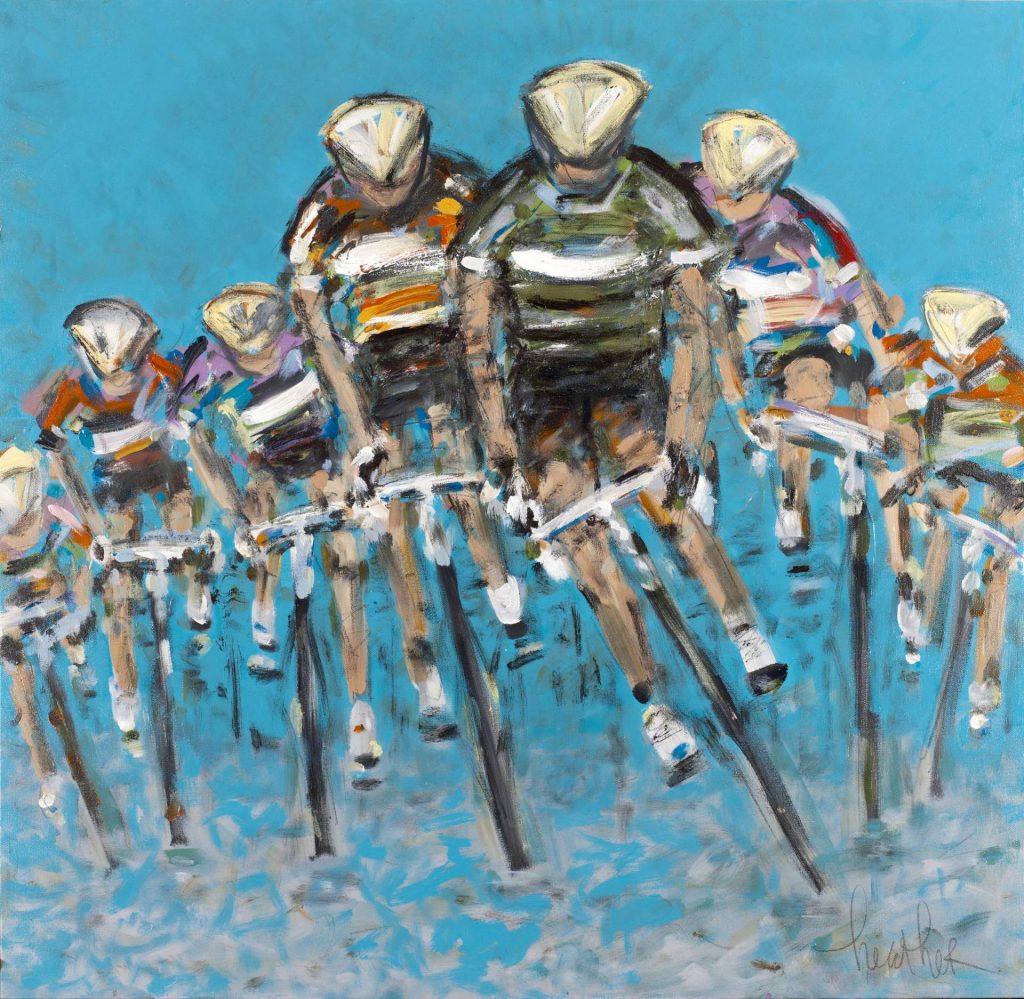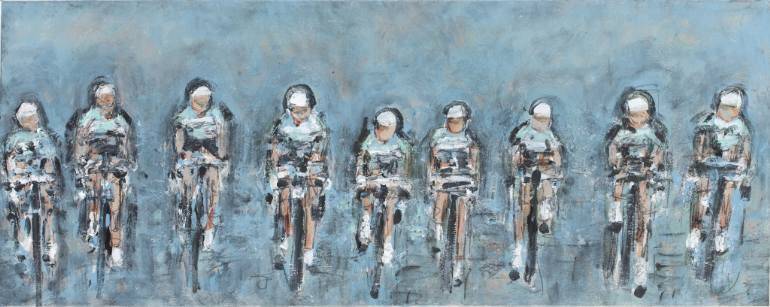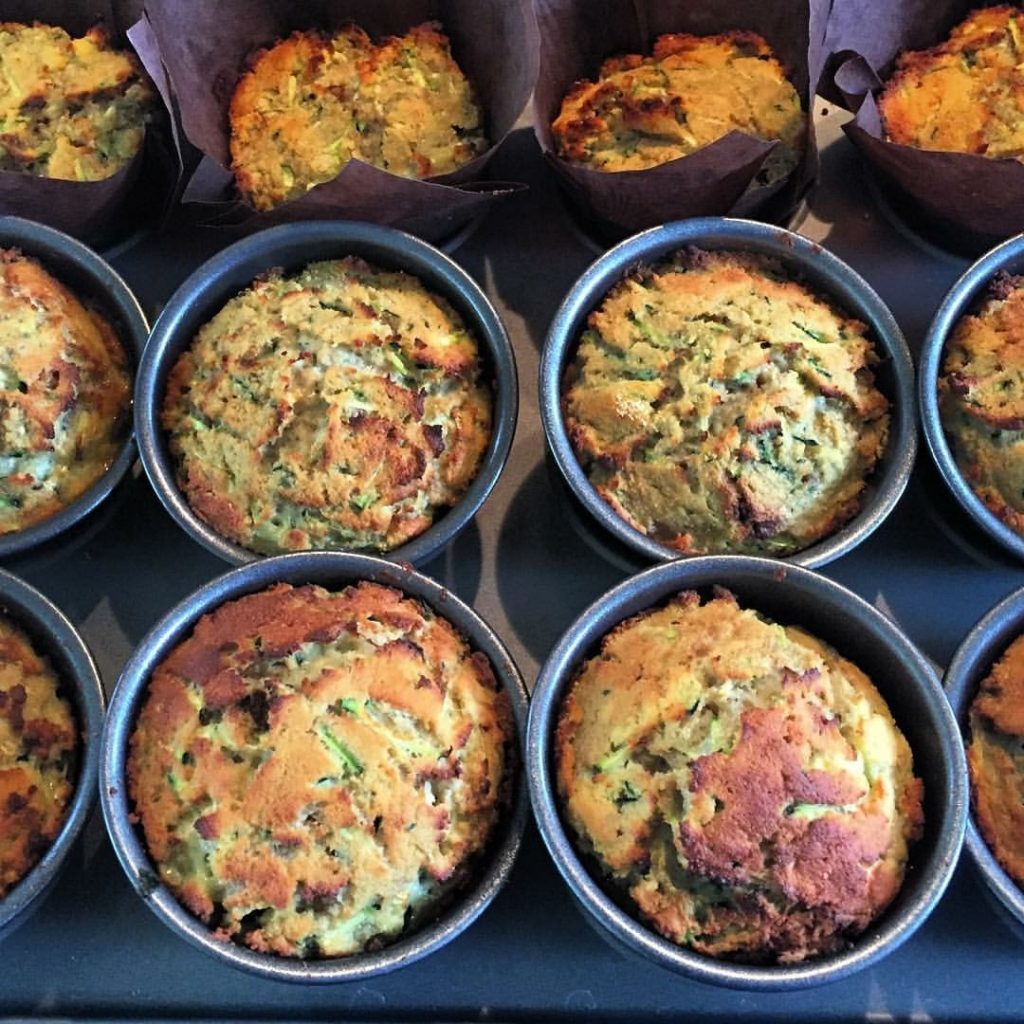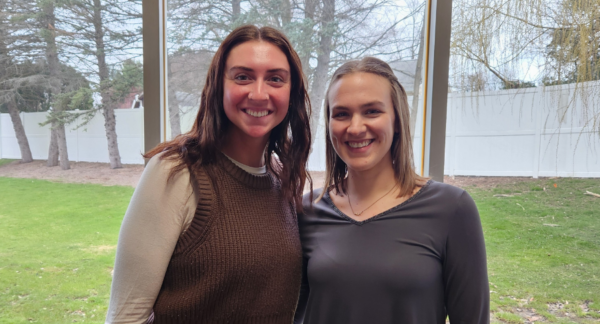5 Ways Cycling Improved My Recovery (and a Killer Muffin Recipe)

Heather Blanton (www.heatherblanton.com); chalk, paint and pencil on canvas; “Cyclist Race Forward in Aqua”
If you’d have said to me 18 months ago, I would be using a bike as my main mode of transport; I’d be cycling in excess of 50 miles a week, I’d no longer wear makeup every day, and my priorities would be eating well and getting enough exercise, I’d have asked you where you had hidden Liv!
Getting Help
Having said that, early last year I formed a relationship with a nutrition coach; she advised me to get active and to try and incorporate daily walks into my routine. During a lunchtime walk in the park, I noticed the bike shop across the road. A few minutes later, I found myself inside the bike shop – feet cemented to the floor while my mind wanted to run out of the shop – but, in spite of my fear, I got over myself and I asked for help. For me, recovery has been a series of ‘can you help me, please?’ one-after-the-other, over and over and over again. With that help, I took a leap of faith, put in the application and I ordered a bike.
When I picked up my brand, spanking new bike, I had to ask for help, again. I said, “How does this work, run me through it?! In spite of my fear, off I went – I literally hopped on and cycled a cool 2.5 miles home. Boom!
Cycling has been invaluable to my recovery. “How?” you might ask, well, here’s 5 ways:
- It has helped me to get over myself – Seriously! I have continuously had to ask for help: for example, how to change the seat to one that doesn’t feel like I’m sitting on an iron rod, and how to fix my bike. Consequently, I have strengthened my humility, which, frankly, has been a very positive thing!
- I have gained a new sense of independence – Another recovery paradox: I got a bike and I gave up my bus pass, but have gained a new lease of life and sense of freedom. Before I was limited by cross-city complications with bus operators, traffic, weather and hours of frustration. Now, I hop on my bike and am where I need to be in about a ¼ of the time it would have taken on the bus. And there is no stopping me. I don’t think twice about a 20 mile round trip. I’ve moved from a life that was getting smaller and smaller, to one where I feel my opportunities are growing, and I visit new places all the time. This keeps my recovery fresh because of my increased sense of freedom and independence.
- I have learned new skills and increased my self-confidence – I mastered two cycle maintenance courses, a road safety course, cycle coaching, I read the highway code, and can now safely and confidently cycle anywhere and perform my own bike maintenance. This sense of accomplishment propels me to take on new challenges all the time, like running my first 5k.
- Spiritually, it gives me a sense of serenity. I can’t describe just how peaceful and meditative cycling home after a meeting in the crisp evening air feels. It’s wonderful. It gives me breathing space, I feel connected and lightened somehow. Perhaps because I have to practice being present, I have to be acutely aware of my surroundings, the workings of my bike and my maneuvering. That’s wonderful for an addict’s brain, which can be all over the place, all of the time. It gives me that, “Ahhhhh,” decompressed feeling that I was seeking in drugs for so long – that timeout.
- I’m physically and mentally much healthier: I have become very fit and lost weight; this improved cardiovascular health lifted my mood, improved my immunity and drastically increased my energy. So, you see, cycling encompasses the mind-body-spirit connection which – I believe – is fundamental to my recovery. My recovery, has to be holistic; I have to deal with every aspect to achieve a kind of recovery homeostasis: defined as “the tendency towards a relatively stable equilibrium between interdependent elements, especially as maintained by physiological processes.” A fundamental aspect of maintaining that balance is good nutrition – it is paramount to a healthy recovery. Not only does it give you a steady form of energy, so you’re not bouncing all over the place like the old days, it keeps your mood elevated, and supports an active lifestyle; one low in illness and high in health – this is the congruence we strive for in recovery. I already felt all over the place for the first year so this made good nutrition a high priority to provide some stability.
Nutrition, Protein and Exercise
With increased exercise, and especially with a focus on weight loss, protein is vital in your diet. Protein is responsible for growth and repair of cells in the body. This is particularly important for those in early recovery, when our body is physically recovering considering all of the damage we did, as well as supporting an active lifestyle requiring muscle power – such as cycling. I have come up with Liv’s Coconut Courgette Breakfast Muffins, which are delicious and I hope you enjoy them! These muffins are packed with nutrients and are full of protein, keeping you full all morning. They are also great for pre and post gym snacks.
Liv’s Coconut Courgette Muffins
They contain eggs, full of protein and healthy fats, thus keeping you full. Additionally, they are are abundant in many vitamins, minerals and antioxidants, including calcium which is great for strong bones, and lutein, which is good for eye health. The statement that eggs are high in cholesterol, and therefore bad for you, is a myth! Actually, for the majority of people, egg consumption consistently leads to elevated levels of HDL (the ‘good’) cholesterol, which is linked to a reduced risk of many diseases.
The muffins contain courgettes (also known as zucchini), which contain significant levels of potassium to control blood pressure and vitamin C to boost your immune system. Its thin dark skin is high in soluble fibre, which slows digestion and stabilizes blood sugar levels – potentially getting rid of those pesky mid-afternoon sweet cravings. Soluble fibre can also prevent constipation and help with those horrible IBS symptoms so many of us endure.
Ingredients
- 3/4 cup coconut flour
- 6 eggs, room temp, whisked
- 1 large mashed banana
- 1/4 cup coconut oil or light olive oil
- 1 vanilla pod (with the inside scraped out) or 1 tsp of vanilla extract
- 1 and 1/2 cups, tightly packed grated courgette
- 1 tbsp cinnamon
- 1/2 tsp nutmeg (optional)
- 1 tsp baking powder
Instructions
- Pre-heat the oven to 180 (UK) / 350 (US) and lightly grease the muffin tray;
- In a bowl, combine the dry ingredients and stir until mixed thoroughly;
- In another bowl, or measuring jug, combine all of the wet ingredients (not the courgette);
- Combine the wet and dry ingredients until thoroughly mixed, then add the courgettes. The mix will be quite stiff, this is normal;
- Spoon mixture into a muffin tin and bake for 20-25 minutes until lightly golden and you can remove a skewer clean. Leave to rest for 15 minutes, before removing and placing on a cooling rack.
Details
Prep time: 10 minutes
Cook time: 25 mins
Total time: 35 mins
Yield: 6 large muffins or 12 small




